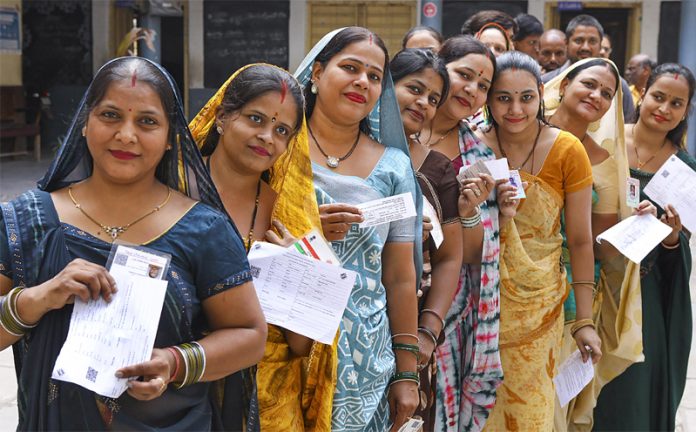No female contestant in Ist phase, one in 2nd and two in 3rd
Nishikant Khajuria
JAMMU, Apr 28: For the first two phases of the Lok Sabha elections in Jammu and Kashmir, there was only one woman among 34 candidates, which means only 2. 94 percent of the total and even far less than their minuscule participation (eight percent) at the national level.
While there are two female candidates, including PDP supremo Mehbooba Mufti and an Independent Gulshan Akhter for the Anantnag -Rajouri Parliamentary constituency, going to polls on May 7 under third phase, still they constitute only 5.5 percent of the combined total, which is again less than the national level participation.
Click Here To Follow Our WhatsApp Channel
For the Kathua-Udhampur-Doda Parliamentary constituency, which went to the polls on April 19, there were total 12 candidates and not even a single woman among them as none of the parties apparently relied on competence of the females, who constitute nearly 50 percent of the voters.
For the Jammu seat, which went to the polls on April 26, there was only one woman, namely Shikha Bandral from National Awami United Party, among the total number of 22 candidates.
Though the final picture is not clear in respect of remaining two Parliamentary constituencies (Srinagar and Baramulla), number of women contestants is likely to remain almost negligible as the candidates officially announced by all the major political parties are male.
Pertinent to mention that at the national level, women constituted only eight per cent of the total 2,823 candidates in the first two phases of the Lok Sabha elections. There were 135 women candidates in the first phase of the elections and 100 in the second phase, bringing the combined total for the first two phases to 235. BJP fielded 69 women in the two phases and the Congress 44.
Despite the fact that almost 50 percent of the voters are female and their polling percentage is also purportedly higher than their male counterparts in the initial two phases of ongoing Lok Sabha elections in Jammu and Kashmir, this significant imbalance in respect of contestants speaks of gender bias among the political parties in fielding woman as candidates.
According to Dr Renu Nanda, a senior Professor in Jammu University, it is a matter of great concern that despite competing with their male counterparts in all fields and even excelling, women are not coming forward in active politics.
” I believe that our male dominating society and women themselves are responsible for such negligible participation as most females lack interest as well as confidence in taking part in the politics,” she opined and suggested that women groups should come forward for instilling confidence among the females while political parties should also take concrete steps to promote women’s candidacy.
Prof Hemla Aggarwal, former Principal of Government College for Women, said that women have their own compulsions and those who want to come forward are discouraged by our patriarchal society and their own families. “Threat of exploitation and character assassination are apparently the main reasons , which discourage women from coming into active politics,” she said and stressed that educated youth should come forward to change mindset of the male dominating society and remove the barriers hindering women’s equal participation in the political sphere.
Senior Congress leader Namrta Sharma, who is a first generation politician and has been active in politics for the last two decades, rued that male counterparts are considered more competent because of the patriarchal society and prejudice towards women. “I believe that party leadership has a critical role in promoting gender diversity and all the political parties must prioritise gender inclusion in candidate selection and provide adequate support to women aspirants,” she added.
Stressing the need to create an environment in favour of women, Namrta Sharma said that women reservation is must for creating a female friendly atmosphere that addresses challenges faced by women in politics.
According to Akshi Billowria, a student leader and Secretary of Akhil Bharatiya Vidyarthi Parishad, J&K unit, family commitments, cultural barriers, fear of defamation and violence, are the apparent challenges faced by the women candidates. “Reserved seats, structural reforms and changing mindset are required for greater gender inclusivity,” she added.


